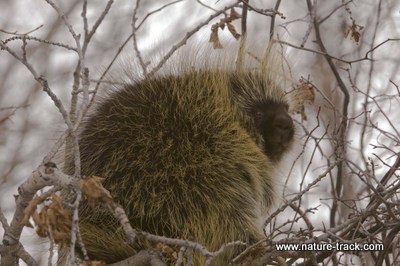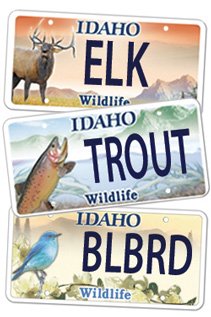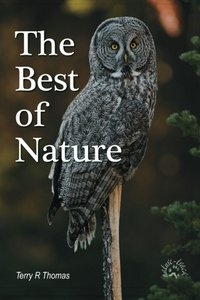What Good Are They (porcupines)

The porcupine is willing and able to defend itself against attack, but really just wants to be left alone to live its mostly solitary life.
After his horse tangled with a porcupine and ended up with an ankle full of quills, a friend grumbled, “Porcupines, what good are they?” This is the same question another friend asked years ago when he chided me for “wasting a column writing about porcupines”.
It isn’t an unusual question. Humans tend to judge the value of just about everything by how they are personally benefited or vexed by it. That seems to be particularly true of wildlife. If a personal or even general benefit isn’t obvious, then clearly we don’t need that species.
A porcupine is a mild mannered creature wanting nothing more than to go about its business and be left alone. When a dog, horse or human can’t abide the live-and-let-live attitude of the porcupine, it can and will defend itself. And for some reason, humans are offended by that.
Here is a small animal, weighing less than 20 pounds, and we won’t tolerate an act of self defense? Perhaps it rocks our world a bit much. As the self-proclaimed rulers of this world is it an attack on our sovereignty to have an animal, especially a small non aggressive one, be able to put us in our place?
A complaint about porcupines is that they damage trees. Absolutely true. However, that viewpoint is literally missing the forest for the trees. Porcupines evolved with the forests and are part of a system of forest replenishment. Trees damaged by porcupines provide critical habitat for dozens of other species. These trees then become part of the nutrient cycling essential to forest health. Chewing on trees only becomes a “problem” when that tree happens to be in a human’s backyard or is part of a commercial plantation.
In a greater context, our ancestors probably had greater respect for the lowly porcupine as they were once a staple of many human diets. Today, few humans eat them but they remain an important part of mountain lion fare. Sure, they may only make up a few percent of the average lion’s chow and if a lion went hungry rather than feast on porcupine, it might be character building. But having porcupines available when other food is scarce or difficult to catch may also mean the difference between life and death for a lion, a species humans seem to value.
Aesthetically, porcupines are just as fun to watch as other wildlife. They may not be as flamboyant as an elk, as personable as an otter or as cute as a marten, but fun just the same. And I actually like knowing that I approach a porcupine at my own peril. There is sport in that.
Regardless of these clear values, porcupines are part of the system and as such are worthwhile. What watch repairman or auto mechanic would discard a part just because he doesn’t understand its function? As Aldo Leopold said, “It is the first rule of intelligent tinkering to save all the parts.”
We shouldn’t have to understand porcupines to appreciate them.

Wildlife License Plates
Great news! as of 2024, there are three NEW designs for license plates. They still are bluebird, cutthroat trout and elk, but they are beautiful.
Idaho Wildlife license plates provide essential funding that benefits the great diversity of native plants and wildlife that are not hunted, fished or trapped—over 10,000 species or 98% of Idaho’s species diversity. Game species that share the same habitats (such as elk, deer, antelope, sage-grouse, salmon, trout) also benefit from these specialty plates.
No state tax dollars are provided for wildlife diversity, conservation education and recreation programs. Neither are any revenues from the sale of hunting or fishing licenses spent on nongame species. Instead, these species depend on direct donations, federal grants, fundraising initiatives—and the Idaho Wildlife license plates.
Both my vehicles have Bluebird Plates. I prefer the bluebird because the nongame program gets 70 percent of the money from bluebird plates, but only 60 percent of the money from elk and trout plates - 10 percent of the money from elk plates supports wildlife disease monitoring and testing programs (to benefit the livestock industry) and 10 percent from cutthroat plates supports non-motorized boat access.
Incidentally, in 2014, the Idaho Legislature denied the Department of Fish and Game the ability to add new plates or even to change the name of the elk and cutthroat plates (very specific) to wildlife and fish plates, a move that would have allowed for changing images occasionally and generating more revenue. It would seem that they believe that we Idahoans don't want a well funded wildlife program.
I think it is time we let the Legislature know that Idahoan support wildlife funding and that we would like to see these generic plates come to fruition.

"WOW. What a phenomenal piece you wrote. You are amazing." Jennifer Jackson
That is embarrassing, but actually a fairly typical response to my nature essays. Since The Best of Nature is created from the very best of 16 years of these nature essays published weekly in the Idaho Falls Post Register (online readership 70,000), it is a fine read. It covers a wide variety of topics including humorous glimpses of nature, philosophy, natural history, and conservation. Readers praise the style, breadth of subject matter and my ability to communicate complex and emotional topics in a relaxed and understandable manner.
Everyone can find something to love in this book. From teenagers to octogenarians, from the coffee shop to the school room, these nature essays are widely read and enjoyed.
Some of the essays here are my personal favorites, others seemed to strike a chord with readers. Most have an important message or lesson that will resonate with you. They are written with a goal to simultaneously entertain and educate about the wonderful workings of nature. Some will make you laugh out loud and others will bring a tear to the eye and warm your heart.
Readers Write:
"You hit a home run with your article on, Big Questions in Nature. It should be required reading for everyone who has lost touch with nature...great job!" Joe Chapman
"We enjoyed your column, Bloom Where Planted. Some of the best writing yet. The Post Register is fortunate to have your weekly columns." Lou Griffin.
To read more and to order a copy, click here or get the Kindle version
Copies are also available at:
Post Register
Island Park Builders Supply (upstairs)
Barnes and Noble in Idaho Falls
Harriman State Park, Island Park
Museum of Idaho
Valley Books, Jackson Wyoming
Avocet Corner Bookstore, Bear River National Wildlife Refuge, Brigham City, Utah
Craters of the Moon National Monument Bookstore, Arco, Idaho